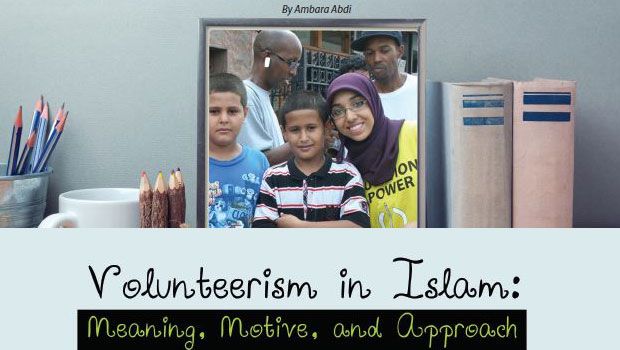A cornerstone of our Muslim tradition is that of service to our fellow human beings — be it offer in refuge to individuals in times of distress or volunteering with organizations as they champion important causes. Allah SWT says in the Quran: “You are the best nation produced [as an example] for mankind. You enjoin what is right and forbid what is wrong and believe in Allah” (3: 110).Muslims should be advocates of justice, working for the common good of all mankind in the spirit of moral uprightness and devoted service, offering solutions for the ills of society and helping to make positive changes for people everywhere.
This spirit of service was clearly demonstrated by some of the early Muslims called the Ansar, an Arabic word which means “helpers.” The Ansar assisted our Prophet(peace be upon him) and the early Muslims by providing a safe haven for them when they migrated from Makkah due to persecution, and helping to establish the first Muslim city, Madinah. They displayed a beautiful example of selflessness and community. The human spirit has the capacity for great acts of selflessness that cuts through the things that too often separate people, like age, race, culture, or socioeconomic status.
Many of us have experienced an “inner call” to act, or felt inclined to respond to requests from community activists to give of our time and other resources to aid individuals or noble causes
When I think of selfless acts of kindness and generosity, the story of an elderly African American woman named Oseola McCarty comes to mind. I recall hearing of her inspiring story on national morning news programs in the mid-1990s. She obtained unsought celebrity at 87 years of age, with 70 of those years spent as a washerwoman – laundering and ironing clothes for a living. She lived alone most of her life, never having married. She considered her work to be a blessing and chose to live very humbly, and feeling no need to own a car, she would walk wherever she needed to go, cutting the toes out of her second-hand shoes if they were too small. It appeared she was completely penniless; however, only she and her local bank knew she was slowly saving nearly every penny she earned, and had managed to accumulate more than $150,000 over the years.
This modest, unassuming woman then made the decision to donate the earnings from her life’s labor in the form of a monetary gift, her total savings of $150,000 minus a small amount for her to live on, to the University of Southern Mississippi. This gift was to be used for scholarships to needy African American students so they could get the education she never received. According to university representatives, her gift was an unprecedented act of generosity, coming from someone who seemed to have so little. In an archived article by Sharon Wertz, available on the University of Southern Mississippi website, Miss McCarty stated: “I can’t do everything, but I can do something to help somebody. And what I can do, I will do. I wish I could do more.”
What Oseola McCarty demonstrated was that anyone who has the intention to contribute to the common good and betterment of others can do so. Most of us may not be in a position to give our entire life savings to serve our fellow man, but there are certainly countless ways in which we can volunteer our time and efforts to help those in need and assist worthy causes. Many of us have experienced an “inner call” to act, or felt inclined to respond to requests from community activists to give of our time and other resources to aid individuals or noble causes. As stated above, volunteerism is a cornerstone of our Muslim tradition, and we do well to take the call to action seriously.
Meaning of Volunteerism
The Random House Unabridged Dictionary defines volunteerism as “The policy or practice of volunteering one’s time or talents for charitable, educational, or other worthwhile activities, especially in one’s community.” From the Islamic perspective, volunteerism can be seen as a spiritual calling to show compassion and provide assistance, to the best of our ability, to any person or cause, whether Muslim or non-Muslim, whether in our immediate circle of contacts or around the globe. The spirit of volunteerism should be that of working in ways, small or large, to make the world a better place for all.
Motives for Volunteerism
Seeking Allah’s pleasure and reward: There can be many motivations for volunteering to help others. The most valuable of these is to please Allah SWT, seeking His blessings in this life and the ultimate reward of earning our place in paradise. The Prophet (pbuh) said: “Whosoever removes a worldly grief from a believer, Allah will remove from him one of the griefs of the Day of Judgment. Whosoever alleviates [the lot of] a needy person, Allah will alleviate [his lot] in this world and the next” (Muslim).Volunteerism is a wonderful pathway for increasing one’s blessings.
Seeking justice for all: As we journey through the labyrinths of life, we quickly discover that injustice is common and widespread. This includes, but is not limited to, poverty and hunger, racial, religious, and gender discrimination and stereotyping, unequal educational opportunities, ignoring the needs of widows, orphans, and the elderly, wars of aggression, and economic exploitation. Prophet Muhammad (pbuh) has said, ”None of you truly believes until he wishes for his brother what he wishes for himself. ”Every individual has the right to food, clothing, shelter, education, self-actualization and dignity. Just as we want the best for ourselves in this world, we should want a dignified standard of living for fellow Muslims, and fellow human beings as well. Volunteering with the intention to help establish justice and equity for all people is a noble motive.
Beneficial use of time: Time is one of the most valuable commodities on earth and there are many duties and responsibilities pulling at us to use our time for this or that purpose. After we’ve fulfilled our religious, employment, and/or family duties, then certain choices can be made as to how to occupy our “free time. ”But how is free time typically used? In taking an honest inventory of our time management, are there perhaps occasions in which we blatantly “waste” time or even, as the saying goes, “kill ”time? Allah SWT says in the Quran: “By time as it passes, verily man is in loss, except those who have faith and do righteous deeds and enjoin one another to truth, and enjoin one another to patience and constancy” (Quran 103:1-3).
Within the 24 hours of a day, it is much more beneficial to use our limited free time to please Allah SWT and benefit mankind through various commendable volunteer activities. Wholesome activities that relax and rejuvenate us are certainly a healthy way to bring balance to our worship and work. But some engage in activities that may be harmful, leading to sin, like the unfiltered use of any and every type of content on the internet and cable TV. Engaging in acts of volunteerism is a highly beneficial use of time for all family members which can be both spiritually rewarding and personally enjoyable.
Realizing help is needed from each of us: Oftentimes we don’t volunteer because we convince ourselves that our help is not needed. Thoughts may cross our minds like, “Someone else will do it ”or “They don’t need me.” But who is that someone else? If we look around our own local communities or open our eyes to the world around, we find there are certainly issues and problems that have been neglected. It is also possible to identify specific things we could do to make a difference. There’s a famous “call to action” quote which was proclaimed in a speech by John F. Kennedy, as well as other leaders before and after him: “If not us, who? If not now, when?” Imagine, for a moment, a world where every human being shrugged off acts of service and volunteerism, convincing themselves that “someone else will do it.” Conversely, imagine if each and every one of us felt deeply that we can and should give of our time and effort to help others.
Approach
Clarify intentions: In order to gain spiritual benefit from our work as volunteers, we must act solely for the sake of Allah SWT, seeking His pleasure. Beginning all our work by saying, “bismillah” (in the name of Allah) is the first step toward ensuring this. However, Shaytan is of course always lurking around the corner, waiting for the opportunity to muddy our perceptions and intentions. We should stay mindful of the tricks of Shaytan while also taking an earnest look at our actual intentions. We must avoid, at all costs, engaging in charitable activities for reasons of personal gain like seeking praise, desiring to be called generous, or wishing to be seen as religious. Prophet Muhammad (pbuh) has said: “Actions are but by intention and every man will have what he intended….” (Bukhari and Muslim).
Choose your area of service: It’s very important to identify the appropriate area in which to volunteer. Oftentimes this can be achieved by matching our talents and interests with needs in our community. There are obviously some tasks which are simple. For instance, one doesn’t need a bachelor’s degree to pull weeds around the masjid or pass out sandwiches to the homeless. On the other hand, if one is a certified accountant, then offering to work with the masjid board as a treasurer could be a good match. The sky is the limit regarding available volunteer activities to choose from. Whether you’re ready to organize the masjid fundraising dinner or are a doctor ready to help at a free medical clinic, there’s plenty of work for everyone. It is important, though, to volunteer in areas for which you are qualified and to be willing and able to complete the project or task.
Be trustworthy and dependable: Once suitable volunteer work has been identified, it is essential to be a dependable and trustworthy worker, completing all the tasks you are assigned to do in the allotted time to the best of your ability. The Messenger of Allah (pbuh) said: “There are four characteristics, and whoever has them all is a pure hypocrite: when he speaks he lies, when he makes a promise he breaks it, when he makes a covenant he betrays it, and when he disputes he resorts to obscene speech. Whoever has one of them has one of the characteristics of hypocrisy, until he gives it up” (Bukhari, Muslim). It’s also necessary to say “Insha’Allah” (Allah willing) when agreeing to do any task. This reminds us that everything is ultimately in Allah’s hands. In addition, when it comes to giving one’s word regarding completing tasks, a good rule of thumb is to “under-promise and over-deliver” rather than “over-promising and under-delivering.”
The spirit of volunteerism should be promoted within families, schools, and Islamic centers. There is an unlimited amount of volunteer work available which we should engage in regularly for the sake of Allah SWT, sincerely hoping to contribute to the betterment of the world around us. Allah SWT says in the Quran: “Let there arise out of you a group of people inviting to all that is good, enjoining what is right and forbidding what is wrong. They will be the successful” (Quran 3: 104).






